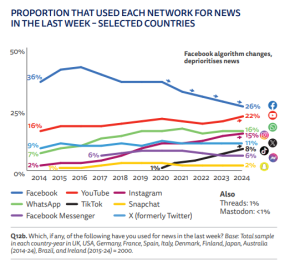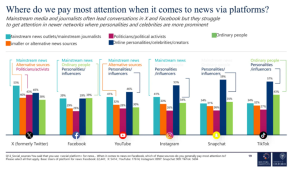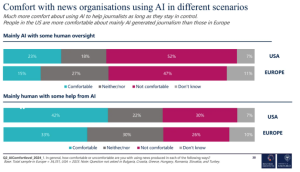The Reuters Institute, in cooperation with Oxford University, recently published the Digital News Report 2024, revealing the worldwide latest trends in online news consumption. The report is set in a particular context of global elections and ongoing conflicts in Ukraine and the Middle East, feeding online news with misinformation and disinformation. This year, the report showcases the growing role of visual and video-led platforms and analyses for the first time audience attitudes towards Artificial Intelligence (AI) in news.
Trust in news
In this year’s report, 40% of all respondents said they trust the news, a similar rate compared to last year. Overall trust is the highest in Finland (69%) while Greece (23%) and Hungary (23%) have the lowest levels. These European cases reflect the challenges faced by several countries regarding undue political and business influence over the media. With a more detailed approach initiated to measure trustworthiness, the report provides the most prevalent factors for audiences when it comes to trustworthiness: transparent approach, lack of bias, high journalistic standards, and fairness.
As trust in news is eroding, news avoidance is simultaneously rising (39%). The report indicates that the ongoing conflicts have a significant impact on the sensation of feeling “overloaded” by the amount of news.
Platforms reset underway
The report shows a technology shift related to changes in consumer behaviors, as video networks and private messaging apps are becoming a more important source of online news. Short-form videos are particularly popular on platforms such as TikTok, YouTube, and Instagram among the younger population, while traditional social networks, Facebook and X (formerly Twitter), are losing ground. Over the past year, Facebook news consumption has decreased by four percentage points worldwide and made way for fragmentation in online news consumption with now several networks involved.

In the meantime, the role of influencers, news creators, and partisan commentators is significantly rising at the expense of mainstream media and journalists. Those alternative voices speak mostly to young people and contribute to the growing complexity of the connection between publishers and audiences online. The report cites the most mentioned individual news-related accounts, among them James O’Brien in the United Kingdom (X, TikTok), Hugo Décrypte in France (YouTube, TikTok) and Tucker Carlson in the United States (X).

Use of AI in journalism
According to the report’s findings, the so-called platforms reset has also been triggered by AI challenges. New developments such as Large Language Models (LLMS) and ChatGPT have reshaped the production of online news content as well as the public attitude toward the use of AI in news. Overall, audiences tend to accept more the use of AI technologies for “behind-the-scenes” tasks but get more reluctant when it comes to public-facing content and important topics such as politics or wars. Furthermore, the complete automation of news production is not desired nor supported in the markets analysed.

Reluctance to pay for news
Across a basket of 20 richer countries, only a minority is willing to pay for news (17%) and a majority would not consider paying to access online news (57%). The report details the publishers’ struggle to sustain their business model among an abundance of free sources and an increasingly competitive online news market. It forces the publishers to find new marketing methods to attract subscribers, the most common being discounting.
“Research documenting these challenges can make for uncomfortable reading, but also provides necessary evidence and insight to help those in journalism and the news industry who are willing to contemplate the need for change to re-engage the wider public”, said Professor Rasmus Kleis Nielsen, Director of the Reuters Institute for the Study of Journalism (RISJ), in the report’s foreword.
The report is based on a YouGov survey conducted on more than 95,000 people in 47 countries.




